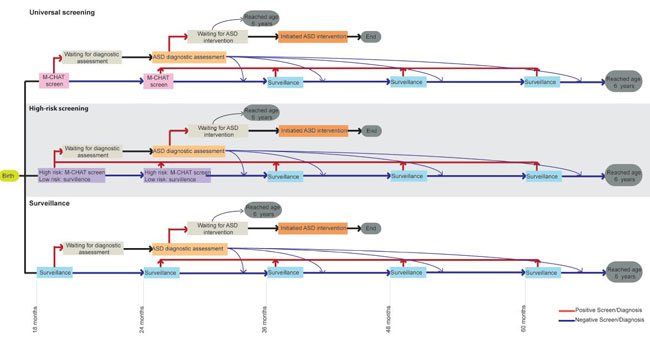The real value for money of universal screening for Autism Spectrum Disorder
Summary:
According to new research from SickKids, universal screening for ASD may not be an effective and cost-effective approach to increase earlier diagnosis and treatment initiation.
Health-care professionals are grappling with how to provide optimal services to children suspected of having autism spectrum disorder (ASD) in a health-care system constrained by a limited budget. According to new research from The Hospital for Sick Children (SickKids) published in the Journal of Autism and Developmental Disorders universal screening for ASD may not be an effective and cost-effective approach to increase earlier diagnosis and treatment initiation. Tracy Yuen, recent PhD graduate, supervised by Dr. Wendy Ungar, Senior Scientist, Child Health Evaluative Sciences, SickKids, conducted the first ever study in Canada that examines the cost-effectiveness of universal screening for ASD.
Approximately one per cent of the Canadian population is affected by ASD, which means there are an estimated 100,000 Ontarians on the autism spectrum. With a high incidence of this disorder, there is a parallel interest in early detection of ASD and the costs and benefits associated with various detection models.
Currently, clinicians in Canada practice “surveillance monitoring”, where a family physician or general paediatrician periodically monitors their patients for potential signs of developmental abnormalities. The recommendation of the American Academy of Pediatrics (AAP) is that all children be screened with an ASD-specific tool (universal screening). Although there is strong theoretical rational for the AAP recommendation, there is no direct evidence that universal screening can lead to earlier access to treatment or improved ASD outcomes over time. As a result, there has been ongoing discussion about whether universal screening should be provided for all children at ages 18 and 24 months.
According to the authors, recommendations for universal screening using the tools currently available, are not supported by evidence showing it can lead to children being diagnosed or treated earlier than using the current surveillance monitoring. The study set out to determine which of the three methods between surveillance monitoring, universal screening and high-risk screening (selectively screens individuals who have a family history of ASD) would be most effective and cost-effective in diagnosing children with ASD earlier. Simulation models were created to predict and estimate the costs and outcomes of universal screening and high-risk screening compared to surveillance monitoring from birth to six years of age.
The researchers found if universal screening were to be implemented in Canada it would be expensive and more importantly it would not result in a timely ASD diagnosis. The cost for every new child diagnosed with ASD through the implementation of universal screening by three years of age would be $757,117, whereas high-risk screening would cost $41,652.
“Though we were not surprised about the financial impact of universal screening, we were surprised to find the delay in accessing ASD-related health-care services for children who need them”, says Yuen. “We found that if universal screening were in place, many children would be falsely identified as potentially having ASD and would then be referred for diagnostic assessment.”
This increase in referrals for diagnostic assessment would, in turn, greatly increase the wait time for children who actually required ASD assessment and early intervention.
“Though previous studies reported benefits of universal screening based on research studies or clinical experience, they fail to account for inefficiencies in the health-care system or the impact if the program was implemented at a population-level,” says Yuen.
This study was funded through the Canada Institutes of Health Research, Doctoral Autism Scholars Award, Ontario Graduate Scholarship and the SickKids Foundation It is an example of how SickKids is contributing to making Ontario Healthier, Wealthier and Smarter. www.healthierwealthiersmarter.ca.


